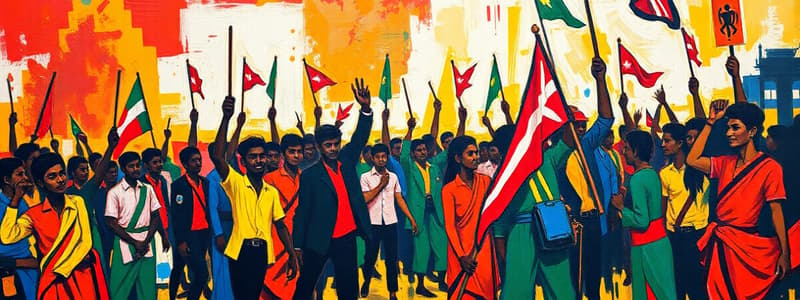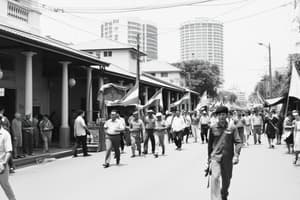Podcast
Questions and Answers
Who were some of the leaders of the armed resistance against the British in Rakhine after the Second Anglo-Myanmar War?
Who were some of the leaders of the armed resistance against the British in Rakhine after the Second Anglo-Myanmar War?
- Myo Wun U Shwe Toke
- Min Thar Gyi Shweban
- Bo Maung Oo Phyu (correct)
- Bo Kyaw Shwee
What was the main purpose of the Young Men's Buddhist Association (YMBA)?
What was the main purpose of the Young Men's Buddhist Association (YMBA)?
Race, language, religion, and education.
The Young Men's Buddhist Association (YMBA) was founded in 1906.
The Young Men's Buddhist Association (YMBA) was founded in 1906.
True (A)
What did the YMBA do in response to the British government's affairs?
What did the YMBA do in response to the British government's affairs?
What significant event related to the Shwemawdaw Pagoda happened in 1918?
What significant event related to the Shwemawdaw Pagoda happened in 1918?
What was the YMBA renamed to in 1920?
What was the YMBA renamed to in 1920?
Who was the first president of the General Council of Burmese Associations (GCBA)?
Who was the first president of the General Council of Burmese Associations (GCBA)?
The people of Myanmar wanted the Craddock Scheme.
The people of Myanmar wanted the Craddock Scheme.
What did the YMBA lead in opposition to?
What did the YMBA lead in opposition to?
What concept did the GCBA aim to achieve for Myanmar?
What concept did the GCBA aim to achieve for Myanmar?
Flashcards are hidden until you start studying
Study Notes
Early Anti-Colonial Movement
- Armed resistance against the British began after the First Anglo-Myanmar War (1824-1826).
- Leaders of the resistance included Bo Kyaw Shwee, Bo Chin Pyan, Min Thar Gyi Shweban, Myowun U Shwe Toke, Myo Wun U Myat Lay, Myo Wun Ye Set Kyaw Khaung, and Myo Wun Maha Uzana.
- Resistance continued after the Second and Third Anglo-Myanmar Wars (1852-1853, 1885).
- Leaders of the resistance in these wars include Bo Maung Oo Phyu, Bo Myat Htun, Myowun U Ngo, Bo Gaung Gyi, Bo Gaung Kalay, Myowun U Bo, Wuntho Sawbwa U Aung Myat, Htake Tin Hmat, Htake Tin Thein, Htake Tin Saw Yan Pai, Htake Tin Saw Yan Naing, Myin Saing Min Thar, Bo Cho, Kyimyindine Min Thar, Bo Ywel, Bo Ottama, U Min Yaung, Phon Kanduwa, Bo Pho Saw, Cawn Bik, Shwegyobyu Min Thar, Sawlapaw, Lin Pin Min Thar, Nang Kham Oo.
- Although resistance was widespread, it lacked unity and coordination, making it difficult to effectively challenge British rule.
Young Men's Buddhist Association (YMBA)
- Founded in 1906 by young Burmese scholars and intellectuals.
- Focused on promoting race, language, religion, and education.
- Held its first National Conference in Yangon in 1911.
- Initially emphasized religion, education, and social activities, but gradually evolved into an anti-British, nationalist movement.
- Protested against British policies and demanded administrative reforms.
- Sent a delegation to India in 1917 to advocate for improved administration.
- Led protests against the British Lieutenant Governor's actions after the 1918 Bago earthquake.
- Opposed the Craddock Scheme, which aimed to appease the people after India was granted dyarchy.
- Sent a second delegation to England in 1920 demanding greater administrative power for Burma.
- Played a crucial role in securing a dyarchy for Burma in 1920.
- The YMBA was the most powerful association in Burma from 1906 to 1920, promoting national consciousness and anti-colonial sentiments.
General Council of Burmese Associations (GCBA)
- The YMBA was renamed the General Council of Burmese Associations (GCBA) in 1920 at its eighth annual conference in Pyay.
- Led by modern-educated youth.
- Aimed to achieve self-government, referred to as "Home Rule."
- Advocated for the appointment of Burmese nationals to high government positions.
Studying That Suits You
Use AI to generate personalized quizzes and flashcards to suit your learning preferences.



